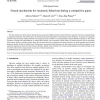Free Online Productivity Tools
i2Speak
i2Symbol
i2OCR
iTex2Img
iWeb2Print
iWeb2Shot
i2Type
iPdf2Split
iPdf2Merge
i2Bopomofo
i2Arabic
i2Style
i2Image
i2PDF
iLatex2Rtf
Sci2ools
NN
2006
Springer
2006
Springer
Neural mechanism for stochastic behaviour during a competitive game
Previous studies have shown that non-human primates can generate highly stochastic choice behaviour, especially when this is required during a competitive interaction with another agent. To understand the neural mechanism of such dynamic choice behaviour, we propose a biologically plausible model of decision making endowed with synaptic plasticity that follows a reward-dependent stochastic Hebbian learning rule. This model constitutes a biophysical implementation of reinforcement learning, and it reproduces salient features of behavioural data from an experiment with monkeys playing a matching pennies game. Due to interaction with an opponent and learning dynamics, the model generates quasi-random behaviour robustly in spite of intrinsic biases. Furthermore, non-random choice behaviour can also emerge when the model plays against a noninteractive opponent, as observed in the monkey experiment. Finally, when combined with a meta-learning algorithm, our model accounts for the slow drift...
| Added | 14 Dec 2010 |
| Updated | 14 Dec 2010 |
| Type | Journal |
| Year | 2006 |
| Where | NN |
| Authors | Alireza Soltani, Daeyeol Lee, Xiao-Jing Wang |
Comments (0)

